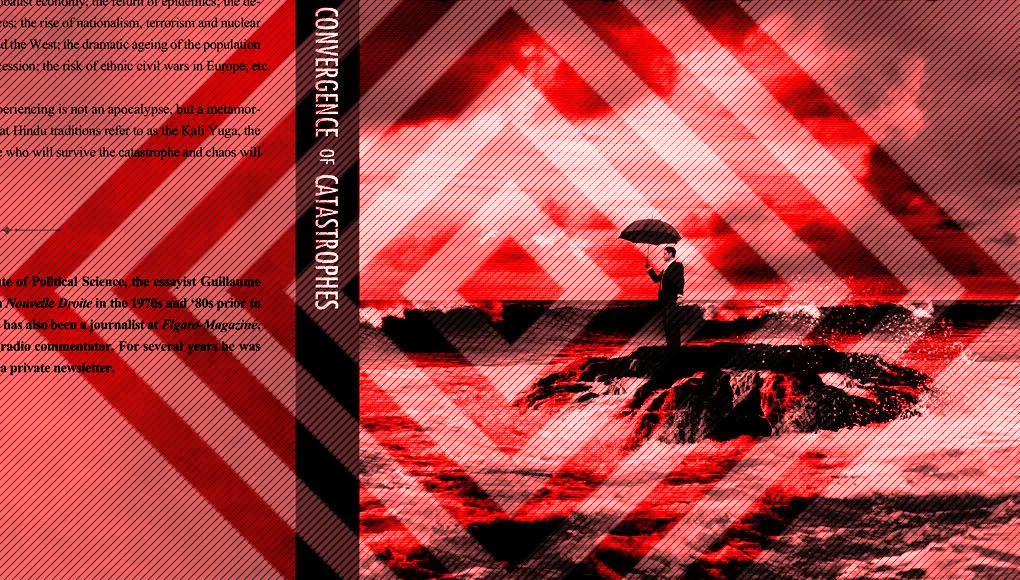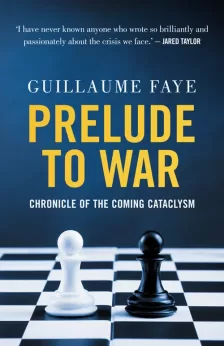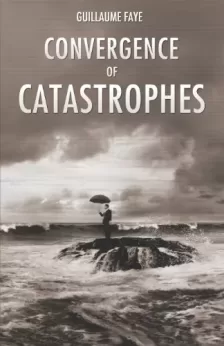For the first time in its history mankind is threatened by a convergence of catastrophes.
A series of ‘dramatic lines’ are approaching one another and converging like a river’s tributaries, with perfect accord (between 2010 and 2020) towards a breaking point and a descent into chaos. From this chaos — which will be extremely painful on a global scale — can emerge a new order based on a worldview: Archeofuturism, conceived as the post-catastrophic age’s conception-of-the-world.1
Let us briefly summarise the nature of these lines of catastrophe:
1) The first is the cancerisation of the European social fabric. The colonising of the Northern hemisphere by the peoples of the South for purposes of settlement, which is increasingly serious despite the reassuring commentary of the media, is pregnant with explosive situations, especially those connected with the collapse of the Christian churches in Europe, which has become a land Islam plans to conquer; the failure of the multiracial society, which is becoming increasingly multi-racist and neo-tribal; the progressive ethnic and anthropological metamorphosis of Europe, which is a true historic cataclysm; the return of poverty to Western and Eastern Europe; the slow but constant growth in criminal activity and drug use; the continual erosion of family structures; the decline of the educational infrastructure and the quality of academic programs; jamming the transmission of cultural knowledge and social disciplines (barbarisation and loss of skills); the disappearance of popular culture due to the degradation of the masses, who have been made passive by electro-audiovisual media (Guy Debord committed suicide because he had seen the future too clearly in The Society of the Spectacle, published in 1967);2 the continual decline of the urban and communitarian fabric in favour of sprawling suburban zones lacking transparency, coherence, legality and safety; the installation, especially in France, of an endemic situation of urban rioting — a low-key May ’683 but more dangerous; the disappearance of all civil authority in the lands of the former USSR beset by economic decline. All this is taking place at a moment when nation-states see their sovereign authority decline and have no success in halting poverty, unemployment, crime, illegal immigration, the rising power of mafias and the corruption of the political classes; just when our creative and productive elites are tempted by the great journey to America. An increasingly egotistical and savage society on the road to primitivism, but paradoxically disguised and offset by naïve and pseudo-humanist talk of the ‘unique morality’, becomes clearer year after year until it reaches the breaking point.
2) But these factors of social breakdown in Europe will be aggravated by economic and demographic crises that are only getting worse. By 2010, the number of active workers will be insufficient to finance the retirements of the ‘grandpa boom’. Europe will collapse under the weight of old people. Ageing countries will see their economies slowed down and handicapped by financing healthcare and retirement expenses for unproductive citizens. In addition, ageing will dry up technological and economic dynamism. The egalitarian ideology of the (old) modernity has been unable to remedy this situation, because of two dogmas: first the anti-natalism (this ethnomasochism) that has censured voluntary attempts to raise the birth rate; then the egalitarian refusal to move from the system of social security paid for out of each year’s taxes to a system of capitalisation (pension funds). In short, we have not seen the worst. Unemployment and poverty will only get worse, while a small minority class will prosper because it is connected with world markets and supported by the class of bureaucrats and protected white-collar workers. We have a date with economic catastrophe. Egalitarianism, proving that it is the inverse of justice in the Platonic sense, is creating societies of socio-economic oppression by the law of unintended consequences. The social democratic welfare state, founded on the myth of Progress, will collapse just as surely as, but with a much louder crash, the Communist system. Europe is becoming a Third World society. We are facing a crisis, or rather the collapse of the socio-economic edifice that is taking the place of civilisation.
America, an immense continent devoted to pioneering migrations and used to a violent culture and a contentious system of ethnic and economic ghettoes, appears to be less vulnerable than Europe. Americans can put up with a breakdown of equilibrium, at least on the level of social stability, but it will not escape an eventual general maelstrom.
3) The chaos of the global South is modernity’s third dramatic line of catastrophe. By industrialising against the grain of their traditional cultures, the countries of the global South, in spite of a deceptive and fragile growth, have created in their lands a social chaos that is going to get worse. The recent events in Indonesia are an omen. The Anglo-French businessman, Jimmy Goldsmith,4 renouncing with perspicacity the way most businessmen think, has analysed it perfectly: emergence of gigantic mushrooming metropolises (Lagos, Mexico City, Rio de Janeiro, Calcutta, Kuala Lumpur . . .) that become hellish jungles; coexistence of poverty that is one step from slavery with rich and insolent authoritarian bourgeois minorities supported by ‘police armies’ intended for internal repression; accelerated destruction of the environment; rise of socio-religious fanaticisms, etc. The countries of the global South are powder kegs. The recent genocides in central Africa, the increase in violent civil conflicts in India, Malaysia, Indonesia, Mexico, etc. (based or not on religious extremism and often stirred up by the United States) are only the foretaste of a dark future. The egalitarian ideology disguises this reality by congratulating itself on the ‘progress of democracy’ in the countries of the South. The talk is deceptive, since these are only sham democracies. Anyhow, is not ‘democracy’ of the Hellenic and European type pregnant with tragedies from unintended consequences (Jules Monnerot’s5 heterotelia)6 and mental incompatibility, if forced upon the cultures of the South? In short, grafting the Western socio-economic model on the countries of the South has turned out to be explosive.
4) The fourth line of catastrophe, recently explained by Jacques Attali, is the threat of a worldwide financial crisis, which will be much more serious than the crisis of the 1930s and will bring on a general recession. The fall of the East Asian stock markets and currencies, like the recession striking this region, will be its harbinger. This financial crisis will have two causes: a) Too many countries are indebted in relation to the world’s banking credit capacities, and not only poor countries. The cost of servicing the debt of European nations is troubling; b) The world’s economy increasingly rests on speculation and the logic of the flow of profitable investments (stocks, fiduciary societies, international pension funds, etc.); this dominance of currency speculation over production runs the risk of causing a ‘general panic’ in the case of the collapse of currency rates in one sector. If international speculators withdraw credit, the world economy would end up ‘dehydrated’, with investments in free fall, because of the collapse of capital markets where industrial businesses and states borrow. The consequence will be a harsh global recession, a gloomy result for a civilisation that rests entirely on economic employment.
5) The fifth line of catastrophe is the rise of religious fanaticisms, principally but not exclusively Islamic, since Indian polytheists are part of the problem. The rise of radical Islam is the backlash to the excesses of the cosmopolitanism of modernity that wanted to impose on the entire world the model of atheist individualism, the cult of the market, the loss of spiritual values and the dictatorship of the spectacle. Reacting to this aggression, Islam has become radicalised, at the same time that it again became dominating and conqueror, in conformity to its tradition. More and more people practice it all over the world, just when Christianity is in decline, having lost its commitment to aggressive proselytism — even in South America and Black Africa — after the suicide of the Second Vatican Council,7 the biggest theological blunder in the history of religions. In spite of the reassuring denials of the Western media, radical Islam is spreading everywhere like wildfire and threatens new countries: Morocco, Tunisia, Egypt, Turkey, Pakistan, Indonesia, and elsewhere. The consequences are the coming civil wars in bi-religious countries, like India, and confrontations in Europe — especially in France and Great Britain — where Islam is likely to become in twenty years the most practiced religion, and the multiplication of international crises involving Islamist states, some of which could possess ‘dirty’ nuclear weapons. In this regard, I must denounce the asininity of everyone who believes in the possibility of a ‘Westernised Islam respectful of republican secularism’. It is impossible because Islam is consubstantially theocratic and repudiates the idea of secularism. Conflict seems inevitable, outside and inside Europe.
[…]7) The seventh line of catastrophe is the development of uncontrolled pollution over the planet, which is threatening not so much the Earth (which still has four billion years ahead of her and could start evolution over again from scratch), but the physical survival of humanity. The collapse of the environment is the fruit of the liberal-egalitarian (but once also Soviet) myth of universal industrial development and an energy-intensive economy for everyone. Fidel Castro, for once truly inspired, proclaimed in his speech to the World Health Organization (WHO) at Geneva (14 May 1998): ‘The climate is changing, the oceans and the atmosphere are warmer, the air and waters are contaminated, the soils keep eroding, the desserts are expanding, the forests are dying, water is in short supply. Who will save our species? Perhaps the blind and uncontrollable market laws, the neo-liberalization going global, an economy growing by itself and for itself as a cancer devouring man and destroying nature? That cannot be the way, or it will only be for a very short period of history.’8 It could not be better expressed . . .
Castro, when he pronounced these prophetic words, must have been thinking of the irresponsible arrogance of the United States that refused to reduce their carbon dioxide emissions (at the summits of Rio and then Tokyo). But was this ‘paradoxical Marxist’ also thinking of the adhesion of every people to the profit model of a market which thinks entirely in the short term, and which encourages pollution, deforestation, the devastation of the oceans’ fish reserves, the pillaging of fossil fuel and agricultural resources with no global planning? Without knowing it, Castro was appealing here, not to a Marxism as destructive as liberalism, but to the ancient Platonic wisdom of justice.
[…]In short, is there not every reason to think that modernity is going to the wall and the planetary accident is irreversible? Maybe not, but then perhaps . . . The essence of History, its motor, is it not the fuel of catastrophe? But now, for the first time, catastrophe could become global in a globalised world. Robert Ardrey, a brilliant American ethologist and dramatist, prophesised in 1973: ‘The modern world is like a train full of ammunition running in the fog on a moonless night with its lights out.’
These impending catastrophes are the direct fruit of modernity’s incorrigible belief in miracles. Let us think of the myth of the high standard of living possible for everyone on a global scale, and the generalisation of economies with a high energy consumption. The dominant paradigm of materialist egalitarianism — a society of ‘democratic’ consumption for ten billion people in the Twenty-first century without a generalised devastation of the environment — is a primitive utopia.
This hallucination runs headlong into physical impossibilities. So the society that it has produced cannot last a long time. The paradox of egalitarian materialism is that it is idealist and materially unrealisable for reasons that are social (it deforms societies) and especially ecological. The Earth cannot physically support the general development of an economy with high energy use that is accessible to all humans. The ‘progress of science’ cannot meet the demands. It is not necessary to reject techno-science, but we do have to refocus it in a non-egalitarian perspective. We shall see this later . . .
The problem, therefore, is not knowing if the planetary civilisation erected by egalitarian modernity is going to collapse, but when. We are therefore in a state of emergency (the Ernstfall9 Carl Schmitt spoke of when he explained that liberal egalitarianism had never understood or made sense of this important notion, since it thinks of the world in a providential and miraculous manner, dominated by the rising line of progress and development). Modernity and egalitarianism have never envisaged their end, never recognised their mistakes and never understood that civilisations are mortal. For the first time there is a certainty. A global order of civilisation is threatened with collapse because it is founded on a paradoxical and bastard idealist materialism. We need a new worldview for the post-catastrophe civilisation.
References
1 Faye defines conception-of-the-world in Why We Fight as: ‘The ensemble of values and interpretations of reality — implicitly or explicitly distinct to a specific human group — whether a people, a civilisation, a family of thought, political or not, a religion, etc.’ From Guillaume Faye, Why We Fight: Manifesto of the European Resistance (London: Arktos, 2011), p. 99.
2 English translation: Guy Debord, The Society of the Spectacle (New York: Zone Books, 1994).
3 In May 1968, a series of strikes by radical Left-wing student groups in Paris were joined by a strike of the majority of the French work-force, shutting down France and nearly bringing down the government of Charles de Gaulle. Although the strikes ended in failure and had evaporated by July, they are still seen as the decisive moment when traditional French society was forced to give way to the more liberal attitude that has come to define France in subsequent years.
4 Sir James Michael ‘Jimmy’ Goldsmith (1933–1997) was a magazine publisher, financier and politician who represented France in the European Parliament between 1994 until his death. He also founded the Referendum Party in the UK. He published a book, The Trap (London: Macmillan, 1994), in which he argued that global free trade, which results in widespread competition over cheap labour in the Third World, is a threat to worldwide social stability.
5 Jules Monnerot (1908-1995) was a French sociologist. He remains largely unknown in the English-speaking world.
6 Faye defines heterotelia as ‘[t]he outcome and consequences of an action whose effects are radically contrary to its intended or proclaimed aim.’ From Guillaume Faye, Why We Fight, p. 157.
7 The Second Vatican Council, or Vatican II, was convened in the 1960s in an effort to bring the doctrines of the Church more in tune with the problems of modern life. Many traditionalist Catholics regard it as a surrendering of the Church to secular pressures.
8 Full text at www.cuba.cu/gobierno/discursos/1998/ing/f140598i.html.
9 Ernstfall, one of Schmitt’s key concepts, is often translated as ‘state of exception’ or ‘emergency case’. Schmitt’s use of this concept is complex, but in brief, Schmitt regarded the rule of law in any society as always being a temporary state of affairs and that modern, liberal concepts of law in particular are insufficient when confronted with a situation that falls outside the routine situations which they were designed to regulate. As such, it is the responsibility of the leaders of a society to determine when the law must be suspended in order to deal with an exceptional situation. Schmitt regarded the National Socialists’ abrogation of the Weimar constitution as being a legitimate use of the Ernstfall. Schmitt discusses this idea at length in his book Political Theology.













